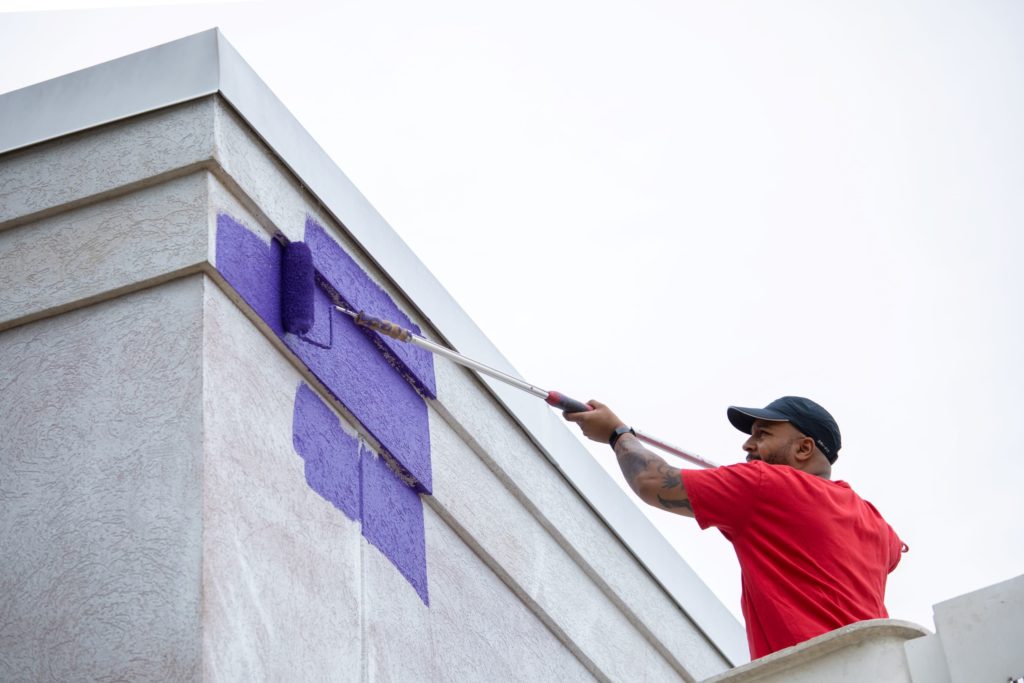
In 2020, MaineCF's Maine Expansion Arts fund awarded Bethel Area Arts and Music to create a mural on the exterior of The Gem theater. Telstar Middle School's community art classes brainstormed ideas for the theme and worked for months with Portland artist and muralist Ryan Adams (pictured). Volunteers spent weeks last summer working eight hours a day to paint about 8,000 square feet. Photo credit: The Gem
As part of the redesign for MaineCF's 2021 grant report, we asked our nonprofit partners if they would like to hear what other groups were sharing in their grant reports. The answer was a resounding, “Yes.” In this edition of Reporting Out, we share what our grantees told us about how their project or program went, how COVID-19 impacted their work, what they learned, and needs they foresee in their communities.
This report covers all grants made through our regular competitive grant programs. It does not include grants made through donor-advised funds, unless those grants were made as a result of our Giving Together program, or funded through our COVID-19 Emergency Response Fund.
Learn more about our competitive grant programs here.
2020 Grant Programs
The grant reports included in this analysis were completed in 2021, for grants funded throughout 2020. Grant terms last for a full year, so the recipient of a grant made in June 2020 would have until June 2021 to complete the funded work and report on the project or program work.
We received reports from 283 grantees across all grant programs, a reporting rate of 48.4 percent. Grant reporting was optional for grantees because of the challenges of the pandemic.
| By the Numbers | |
|---|---|
| Number of grant programs | 29 |
| Number of applications to all programs | 1,122 |
| Number of grants by committees | 512 |
| Number of grants by donors | 72 |
| Total number of grants funded | 584 |
| Overall success rate | 52% |
| Total awarded | $4,463,731 |
| Average award | $7,905 |
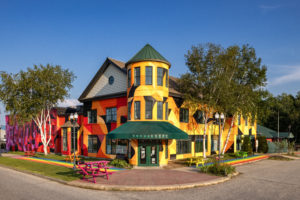
The Gem
When COVID shutdowns began in March 2020 the deadline for several grant programs had passed, including our largest, the Community Building. However, decisions on awards had not been made, so staff opted to expedite the grantmaking process. This provided for faster decisions and distribution of funds to grantees. In addition, grantees were allowed to use their grants for general operating support instead of the proposed project and had flexibility in time to complete the work.
In response to the ongoing pandemic, many of the fall grant programs added general support as an option to the types of funding offered.
Impact of COVID
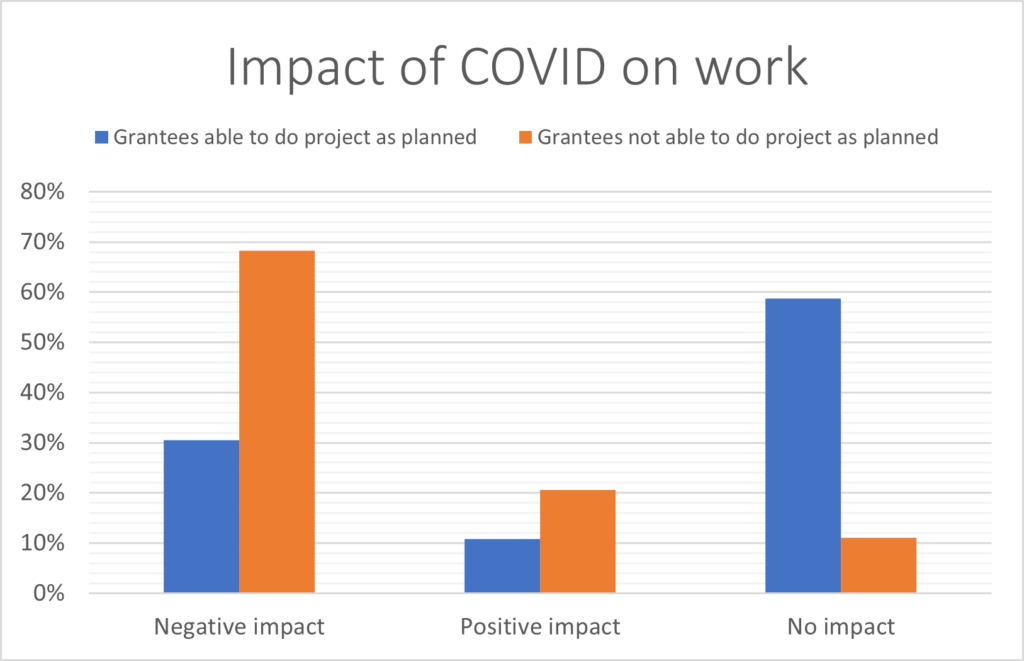
As might be expected, the pandemic impacted the ability of many grantees to complete the projects that they proposed. About 77 percent of grantees reported that they were able to generally complete their project as they proposed in their application, while 23 percent reported they had to change course in response to the pandemic.
The impact of the pandemic was felt across grant programs: 40 percent of grantees reporting that it negatively impacted their work.
A comparison of grantees able to complete their projects versus those who couldn’t shows a significant difference in impact. The chart below shows that organizations that could complete their work as proposed reported a much higher rate of “no COVID impact,” while those that had to change their plans reported a significantly higher negative impact.
Common negative COVID-related impacts included:
- Delays due to overwhelmed contractors or supply-chain issues
- Increased demand on programming, especially in the social service sector
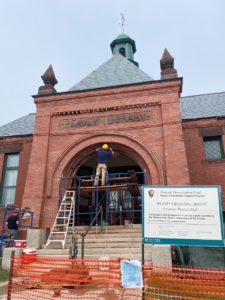
The Eastport Public Library Association was awarded a 2020 grant through MaineCF's Belvedere Historic Preservation and Energy Efficiency Grant Program to restore the exterior of Peavey Memorial Library, a 127-year-old Romanesque Revival in Eastport's downtown.
- Challenges connecting with their communities due to restrictions around gatherings
- Concerns about the mental health and wellness of staff, clientele, and communities
- Reduced revenue due to canceled fundraisers or donors concentrating on frontline-serving organizations.
"So many of our youth can't attend our digital programming because it would mean their families could walk in or hear them talking. Or they deal with housing insecurity and don't have a Wi-Fi connection or equipment to attend a video call."
"[We survive] on earned-income, charitable donations, and grant funding and have a highly professional staff that includes three, full-time employees, all of whom were put on furlough during the pandemic."
A small portion of grantees (13 percent) noted that there were some silver linings to changes brought by COVID:
"We are very proud of the fact that we were able to help so many people despite the ongoing global pandemic. We shifted client advocate visits to virtual visits. This allowed for less traffic in the clinic to keep our staff and clients safer. We've realized that this format also increased access as it reduced transportation, childcare and economic barriers for some of our clients."
"One of the proudest things that happened was that the children of the migrant workers were able to take our summer camp because families could attend by cell phone, whereas they would not have been able to attend in person due to transportation and other issues."
United Way of Tri-Valley Area received a grant through the Maine Charity Foundation Fund to collaborate on new and improved options for volunteer-based transportation focused on older adults. They used funding to hire a coordinator to research, implement, and oversee a volunteer rides program in Greater Franklin County. After assessing what worked in other areas, they launched a volunteer ride program in Rangeley. By taking time to research and plan first, they were able to learn from the experience of other communities. The pilot program Community Rides is serving those 55 and over with a focus on regional, short-distance transportation needs, including both medical rides and non-medical rides. The program is a collaboration of United Way of Tri-Valley and Western Maine Transportation Services. United Way is also working closely with a number of other entities and individuals to build a firm foundation, including Rangeley Health and Wellness Partnership, community volunteers, and area churches. “The hyper-local focus of the Community Rides program - one built on trust of volunteers from the community riders are being served - is essential. We learned this through numerous conversations with communities and chose Rangeley as there were existing partnerships, and an underserved aging community with transportation barriers. Taking the extra time to carefully research and plan a new volunteer program paid off, especially during a pandemic. As they said in their grant report: “There are extraordinary resources in our state from which we should always draw. We did not need to reinvent the wheel, so we spent valuable time researching community rides programs that currently exist."
What We Learned
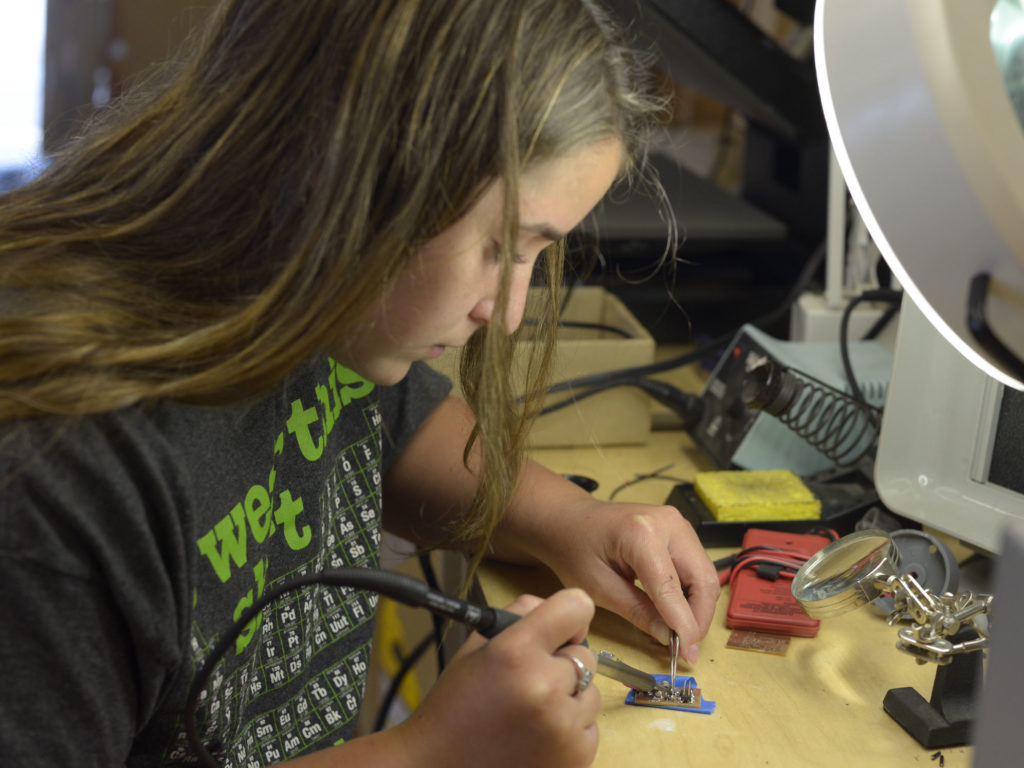
In 2020, interns with the Haystack Mountain School of Crafts Fab Lab manufactured 3,500 face shields and 2,500 ear savers for community organizations with funding through a grant from MaineCF's Downeast Innovation grant program. Photo courtesy Haystack Mountain School of Crafts
We regularly ask grantees: “What have you learned from the work or project funded by this grant?” This helps us identify trends and best practices that we can support.
More than 34 percent of grantees reported their biggest learning was the importance of planning. Many wished they had spent more time planning up front to avoid some surprises. This was particularly true for capital projects, which were often surprised by cost overruns, different needs than anticipated, or bad contractor choices.
Others were glad they took that time to thoroughly plan and research their project. Some will take what they learned from this grant and use it to plan their future work. And others acknowledged that the pandemic forced them to operate in a more reactive rather than proactive manner, so they weren’t able to plan as they might like.
"There is a greater hunger for learning hands-on skills in our community than we realized. One challenge was the heightened importance of registration and participant caps due to the pandemic, requiring us to keep in-person participant numbers low. Managing registration so we were sure we were clear about the numbers took more time than anticipated. We originally had decided to record these workshops and post them on our website. We quickly realized this was above our capacity."
"One thing that we've learned is how important record keeping is for any organization, as committee members change over the years and records can easily disappear."
"I would get an up-to-date and detailed estimate from the contractor. We ended up having a bigger bill than anticipated."
"We have realized that we need an easier way to determine if folks qualify for our assistance. We will be looking into what others are doing and tweak our process."
"I hope we never have to muster an emergency response to a pandemic again. If we did, the difference would be that we have now had the experience and might have more insight into how to plan and execute an emergency response."
Other Lessons Learned
- Importance of outreach to the community or population being served to ensure their plans made sense
- Collaboration with other organizations saved time, increased effectiveness, and helped reach new parts of their community
- More capacity needed to complete the project the way they would like
- Attention to issues of racial equity, either to include more of the community or to better react to specific needs.
- Organizations that invite Black, Indigenous, or other people of color (such as artists, performers, lecturers, or consultants) into their predominately white communities need to plan for the safety and support of their guests.
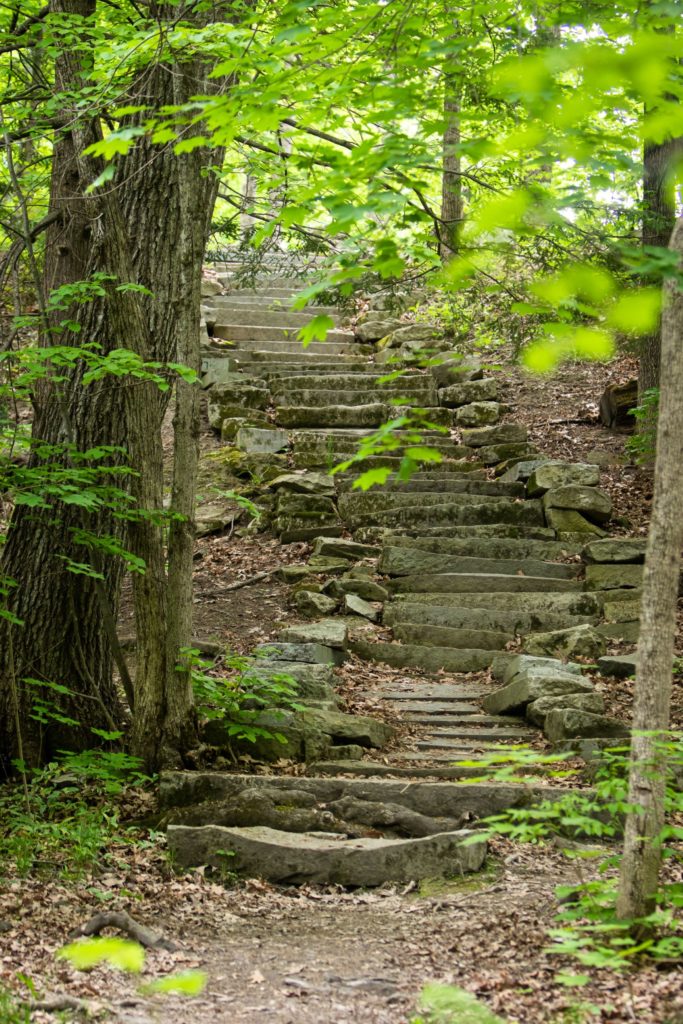
Portland Parks Conservancy's 2020 grant from MaineCF's Conservation for All Fund supported its efforts to make Riverton Trolley Park more accessible to an underserved Portland neighborhood lacking usable park space
What’s Next
We are aware that proposals and reports only present a limited picture of the work that an organization undertakes in a year and that MaineCF funding offers partial support for a limited amount of time. Thirty percent of grantees see ongoing needs related to their grant-funded projects or programs.
MaineCF appreciates the willingness of grantees to share their work and needs with us. As a result of our partnership, MaineCF has made the following changes to our grantmaking:
- Included general support as an option for some of our competitive grant programs, including the 2022 Community Building Grant Program
- Continued to encourage donors to support proposals through our Giving Together program. Donor funding of applications has doubled since 2017. In 2021, donors accounted for 27 percent of the proposals funded through the Community Building Grant Program
- Encouraged our committees to fully fund more proposals. The average grant award has increased from $4,650 in 2017 to $7,906 in 2020
- Creating program protocols that ensure a safe and supportive environment for people of color or individuals from marginalized groups.
We hope the changes have made it easier for nonprofits to do their work.





